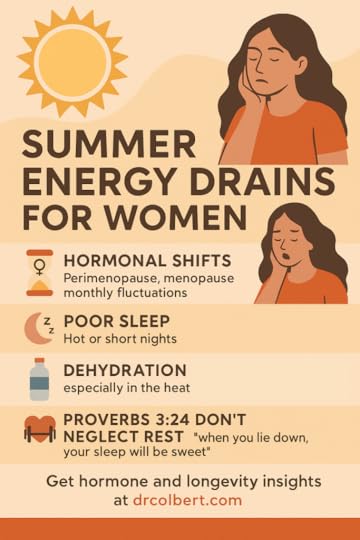Why You’re More Tired in the Summer—And What Your Hormones Have to Do With It
If you’re a woman who’s felt more drained, foggy, or off balance in the summer months—even when you’re sleeping decently and soaking in the sun—you’re not alone. In fact, women may be especially vulnerable to summer fatigue, and the reasons go far beyond just heat and dehydration.
There’s growing research showing that hormonal fluctuations, light exposure, and stress on the body’s internal rhythms can hit women harder due to the natural complexity of the female endocrine system. If you’re navigating perimenopause, menopause, or even monthly cycle shifts, summer can magnify the fatigue.
Let’s break down how seasonal changes affect hormones—especially for women—why that leads to exhaustion, and how to support your body naturally and preventatively.
Women’s Hormones Respond Intensely to Light, Heat, and Routine
Your body was designed by God with incredible precision. The endocrine system—which governs hormone production—reacts to external cues like light, temperature, sleep, and nutrition. For women, who already cycle through monthly hormonal patterns, these shifts can be more profound.
1. Melatonin Production May DeclineWomen tend to be more sensitive to melatonin disruption, and longer daylight hours in the summer can reduce this vital sleep hormone. Lower melatonin means reduced sleep quality and nighttime restlessness—both of which undermine hormone restoration.
2. Cortisol Patterns Become UnstableThe body’s stress hormone, cortisol, can spike at irregular times when routines are disrupted (think late nights, travel, and irregular eating). Women often juggle more responsibilities, especially in summer months with kids out of school, leading to a wired-but-tired crash cycle.
3. Thyroid and Estrogen Are Vulnerable to Vitamin D DeficiencyDespite abundant sun, vitamin D levels can still dip due to sunscreen use, indoor time, or poor absorption. Low vitamin D affects thyroid function and estrogen balance—both crucial to sustained energy and mental clarity.
4. Dehydration Disrupts Hormone TransportIn hotter months, fluid loss can become a serious disruptor. Hormones like insulin, thyroid hormone, and cortisol require adequate hydration and electrolyte balance to circulate and function properly.
Why Summer Hits Women’s Hormones HarderIn addition to seasonal shifts, women’s hormonal systems are more easily tipped off balance by common summer behaviors:
Late-night meals and blue light exposure (TV, phones)Alcohol and caffeine intake, which stress adrenal glandsBusy travel schedules with poor sleep hygieneSugar-rich snacks and irregular meals disrupting insulinPerimenopause or post-menopause making cortisol and estrogen harder to regulateThis creates a perfect storm for feeling sluggish, overwhelmed, or emotionally “off.”
Signs Your Hormones Might Be Behind Your FatigueWomen often experience hormonal fatigue as:
Afternoon slumps or crashesRestless sleep (especially around ovulation or PMS)Foggy thinking or short temperStronger cravings for sugar or caffeineMood instability or low motivationIf these symptoms show up during summer, your hormones—not just your schedule—may need support.
How Women Can Naturally Reset Their Energy
Here are gentle, effective ways to restore hormonal harmony and beat summer fatigue:
1. Ground Yourself with a Consistent Morning RoutineSunlight before 10 a.m. (without sunglasses), hydration, and slow, mindful movement like stretching or prayer walks help reset your circadian rhythm and stabilize cortisol.
2. Support Your Adrenals, Thyroid, and Estrogen DetoxAshwagandha, rhodiola, and magnesium can help your body handle stress more gracefully. Support estrogen clearance with cruciferous veggies and fiber (Fiber Zone).
3. Replenish Vitamin D and GlutathioneVitamin D3 supports bone, mood, and hormone balance—especially important for women over 40. Glutathione boosters like NAC or liposomal glutathione can assist in detox and protect hormone receptors.
4. Eat Like Your Hormones MatterPrioritize clean protein at each meal (chicken, fish, grass-fed beef)Use healthy fats (avocado, olive oil, coconut)Add cruciferous greens (broccoli, Brussels sprouts)Include seeds and fiber to regulate estrogen and progesterone5. Focus on Restorative Sleep and Gentle ExerciseAvoid overtraining in the heat. Walking, light resistance training, or Pilates paired with solid sleep hygiene can restore your energy without taxing your adrenals.
A Quick Note on Faith and FatigueAs women, we often carry a lot—emotionally, mentally, and spiritually. But God never designed us to power through in our own strength.
“Come to me, all who are weary and burdened, and I will give you rest.” — Matthew 11:28
Rest is not weakness—it’s a divine rhythm for restoration. Honor the signals your body gives you. Support your hormones as part of stewarding the temple God entrusted to you.
Final ThoughtsBefore you go—if you’re interested in learning more about how hormones impact energy, beauty, mood, and aging, I encourage you to check out my recent podcast with Mary:
Unlocking the Power of Hormones for Longevity: Estrogen, Progesterone & Vital Insights – Part 1
In this episode, we go deeper into hormonal health, longevity, and how to advocate for your well-being with confidence. It’s a valuable listen for every woman over 40.
Summer fatigue doesn’t have to define your days. When you understand what’s really going on beneath the surface—and align your habits with how God designed your body—you can feel vibrant and grounded, even during the busiest season of the year.
To your health,
Dr. Don Colbert, MD
The post Why You’re More Tired in the Summer—And What Your Hormones Have to Do With It appeared first on .
Don Colbert's Blog
- Don Colbert's profile
- 72 followers



